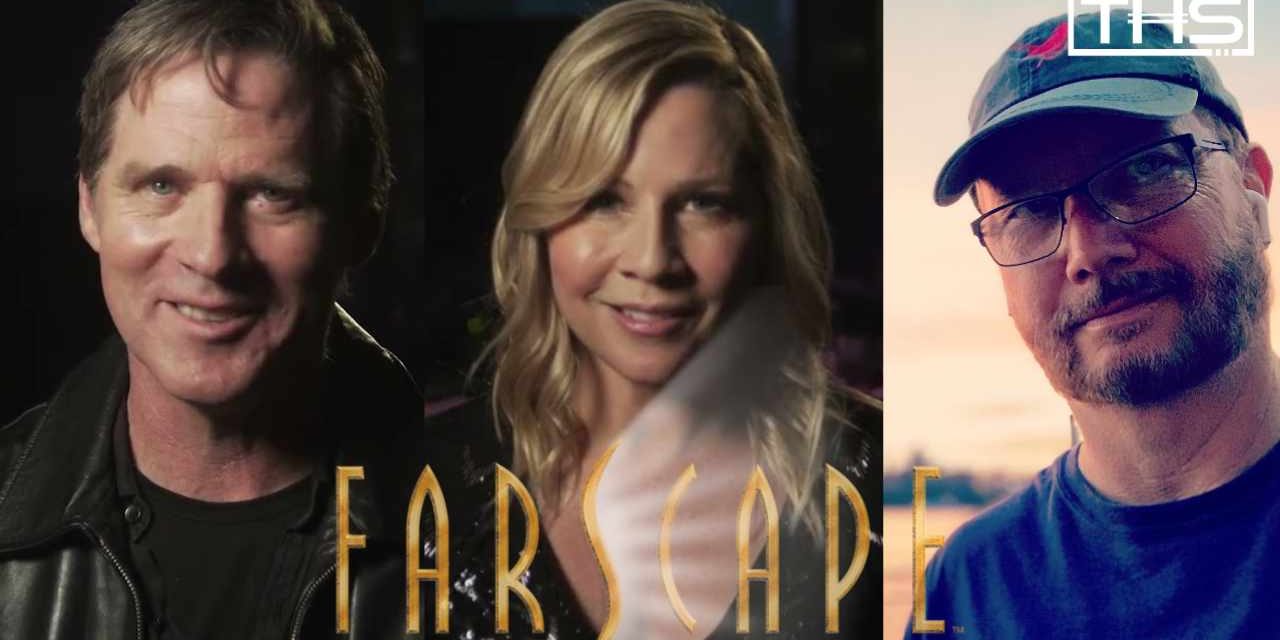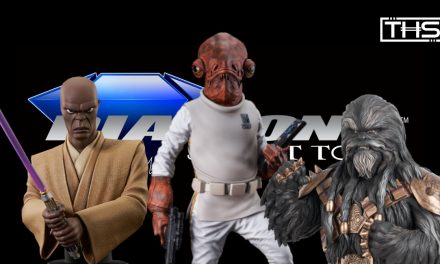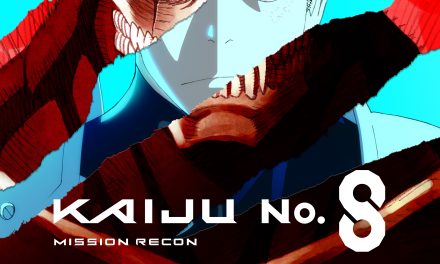In 1999, Farscape joined the sci-fi TV canon and set the seeds for decades of fans. Aired on Sci-Fi Channel years before it became SyFy, Farscape was an outlier among its peers. A free-flowing and chaotic series that was filled with impressive puppet creations and an anarchic tone, Farscape ran for four seasons before coming to an end. However, the impact of the series can’t be understated. This is true for a fanbase that continues to grow decades after the show debuted, and it’s true for the genre as a whole. That loose tone and tenor of Farscape can be felt in sci-fi that’s come since, with creatives like James Gunn citing the series as a direct inspiration for his take on the Guardians of the Galaxy.
Twenty-five years after the show debuted, Shout! TV is celebrating Farscape’s legacy with a new DVD home release of the series, along with a celebratory marathon of the entire show. In honor of the event, That Hashtag Show got the chance to sit down with series creator Rockne S. O’Bannon, as well as stars Ben Browder and Gigi Edgley to discuss the legacy of Farscape, what separated the series from other sci-fi properties, and what it’s like to
RELATED: ‘FALLOUT’ CAST AND CREW TALK THE SHOW AND ITS ORIGINAL STORY

25 Years Of Farscape
Congrats on 25 years of Farscape! It really does feel like something more attuned to modern sensibilities when you look back at it.
Gigi Edgley: It’s very organic and very relatable. Very deep and meaningful. When I watch Farscape I see a crazy family trying to make their way through uncharted territories. Before Farscape — and don’t throw stuff at me — I wasn’t a big sci-fi fan. I was more into phantasmagorical stuff. Dark Crystal, Labyrinth, The Neverending Story, that I could relate to. For some reason, a lot of the Sci-Fi I’d seen before Farscape, I couldn’t connect with. Maybe I wasn’t old enough. Maybe it was just that time in my life… there’s something magical about Farscape. I mean, I’m super biased. So it’s hard for me to tell. But I just it draws me in deeper now. My child is called Skywalker. So I’m all sci-fi now [laughter]. There’s just something very magical about Farscape.
Ben Browder: Farscape was transitional. We built off the shows that came before and what they had done. Farscape pilfered from Twin Peaks and other edgy television, which told long arcs, and non-episodic stories. We started very episodic, and then we transitioned. It was building off all of the great science fiction shows, movies, and literature that had come before us. It was just mushing it all together and throwing it out there. Now, you will commonly see that. You sit down to watch Silo, it’s a long arc with a lot of different people. You look at The Leftovers from just a handful of years later, a decade after Farscape came out. It’s unique and different and interesting. I think it’s brilliant. But you can see the seeds of things that we were doing in shows at the turn of the millennium, just like you’ll see the seeds of things we did in Star Trek The Original Series.
What has been the biggest surprise of Farscape‘s legacy?
Rockne S. O’Bannon: Well, obviously, when you create any TV show — and I’ve done a bunch of them — you never know what sort of reaction it is going to get. When you’re in the thick of making the show, you just make it the best you can. You can’t really think of any sense of longevity. There are so many intangibles that go into the success of a show that you have no control over. [Farscape] just became one of those shows where it was it was a confluence of all these incredible factors… some of it is the storytelling, obviously, I’m very proud of the work that my writers and I’ve done on the show. But it’s the cast, starting with Ben Browder at the top. He was just the boldest actor, and was willing to kind of do anything. [The whole cast] embraced the wantonness of the storytelling. Shooting in Australia was incredibly important. Having access to the Australian sensibility was… a huge contributing factor. There was the fact that we had little network interference.
The studio was the Jim Henson Company. Brian Henson was as nutty as the rest of us. He was as anxious to have things that were unconventional and surprising to the audience. The Sci-Fi Channel here in the States, they were a network that was dedicated to genre. [Farscape] was not quite a regular procedural show. So, having said all that, you have no idea if anything is going to have any sort of longevity at all, let alone 25 years later.
We’ve been chatting about a show that seems to be gathering new fans all the time, which is great. We’re on Shout! TV right now which is great, so people have an opportunity to see it. There’s going to be a marathon celebrating the 25th anniversary. There’s a 25th-anniversary DVD with all sorts of new background material and bonus stuff. Here we are 25 years later and it’s really kind of fun and very gratifying just to reintroduce it to new fans and the fans who may not have seen it for a while can kind of find it again.
Ben Bowder: I can’t say that I saw any of it coming. When I build a character, I build the character to a point and I go, “Okay, I think this person is like this, the person has certain kinds of experiences.” You sort of build it out, and then you step into John’s boots. But from that point forward, we don’t where we’re going end up in 10 years or 25 years. The writers have certain points that they may want to get to. Smart writing will be reacting. You write something or you do something and you act something, and it will surprise you. Then your imagination takes over.
You build upon what’s there, and you build upon it, and you bring in a new character. That new character adds a new flavor to the story. In the case of Farscape, you bring in a whole new race, and that will that will change the arc of the story. It changes the arc of history and of the future. That’s the world we live in. It’s the value of storytelling, for all of us to to stand in someone else’s boots, to sit in someone else’s chair. When when you do that, and successfully. It’s a bit like dreams, it’s kind of rehearsal for life and for for growth.
RELATED: KRISTEN STEWART, KATY O’BRIAN, AND ROSE GLASS DISCUSS “LOVE LIES BLEEDING”! [INTERVIEW]

Breaking Trends
Something I think that was crucial to Farscape’s success is the way it eschewed sci-fi of the era. It wasn’t just another sci-fi show, it was willing to bend the genre in ways we’ve seen become more commonplace in modern takes on the genre. Why was it important to blend those elements together?
Rockne S. O’Bannon: I think the operative word was what you just said — “another.” I’m a huge Star Trek fan, original series and Next Generation. But at the time, I referred to Farscape as kind of the anti-Star Trek. I didn’t mean that in a negative sense. There was already Star Trek and some other shows that had ships predicated on a military background or military hierarchy onboard the ship. I wanted the exact opposite. We wanted the ship to be filled with anarchy and as fractiousness as possible. That was kind of my watchword kind of going into this.
Gigi Edgley: I don’t know what it is. I don’t know what the difference is. And my best mate is Rod Roddenberry. I love that man. I know all the Sci-Fi greats. But I can tell you, all the appearances and conventions and Comic-Cons…. The stories that I’ve heard, the hearts that it has touched, there’s something whimsical about [Farscape]. Even kids today that are too young to have seen it originally, but their parents have introduced them. They’ve seen it on streaming networks. I’m still hearing extremely deep, heartfelt stories about how people connect with the stories and connect with Farscape and connect with the characters. There’s something there that is very phenomenal.
It’s so funny because we’ve gone through so much recently. I wonder whether Chiana would have been so risky. The thing is that in the world of television, you can have creatures, and you can have stories, and that’s okay. Something with Farscape that I found very refreshing is that these were stories that made sense. Even though they were aliens and critters and creatures. I’ve done a lot of shows… what made Farscape special was it all made sense, it was very imperative that this thing had to happen to get to the next thing or to get off the planet. The stories were so beautifully written. They allowed our characters so much artistic license. It was stunning. [Chiana] made me so brave. It just felt like this cast and the crew, the crew were a huge part of it.
Because we were blowing stuff up, we were flying off walls. Even when we would come in to shoot a pretty basic scene,… I think that’s one of the many reasons why people connect so deeply with this show. Because there are choices coming from [the heart]. I mean, it’s pretty amazing. My mom’s always like, “Come back and be home, can you earn a living and be an actress?” I’m like yeah, but not much. I just did a scene with Susan Sarandon, and did a voiceover with Rick and Morty.
I would have never had those amazing experiences and I wouldn’t be able to go to so many Comic-Cons too and create my own productions. I’ve met so many amazing people. I’m so grateful for my little adventure and my career in Australia, but I feel like at some point, I was just treading water. And I really wanted to explore and I couldn’t have done any of that without the amazing support from the Farscape lovers. I’m so grateful to all of you guys out there
RELATED: JEFF WADLOW & JASON BLUM TALK THEIR NEW FILM, IMAGINARY [INTERVIEW]

Looking back, are there any particular props or puppets that still stand out to you? Which elements of Farscape can you still not believe you were all actually able to make work on screen?
Rockne S. O’Bannon: There are so many things and what was great was early on, the writers would kind of describe the character, The alien, that sort of thing. Then our creature designers would just come up with something that — it worked for the story, but it was something we couldn’t have conceived ourselves. It kind of taught me that if you’ve got artisans in any department — that could be obviously the animatronic creatures, but even makeup or cinematography. With any artists, tell them what you need that is story-specific, but don’t try to impose anything beyond that. That’s their entire world. You’ll get something back that’s wildly different than what you’d ever expected. So, I’d say that’s what I kind of discovered.
So many characters that we did, I thought they were fascinating. I would have to an obvious choice though: Rigel. He was as small as we could get a puppet or animatronic character. He could be operated by two or three different people, and still be performative. I wanted them as small as possible. They just imbued him with so much personality. Even though he was a puppet, and we were on a TV schedule… you don’t get the opportunity for reshoots that other shows or that you have on a feature film. He was still given so much personality, that people will just forget that he’s a puppet because they’re watching him and the stuff that’s coming out of his mouth. I think that served us incredibly well. on two fronts. We were successful in that regard, in terms of people who did lose themselves in Rigel as a character. But it also just pushed us to make sure that his personality was as extreme and out there and entertaining as absolutely possible.
Gigi Edgley: I mean, we there was it’s interesting because there was a ton of graphics as well. Like, a ton. There were a lot of tennis balls and there were a lot of flying snakes and a lot of holograms… but people still remember, and it’s one of the top comments I’ve definitely received is that the show holds up so well because the practical effects feel real. There is a ton of graphics as well but the puppets and creatures are SO realistic. When people say, “Well, what’s it like acting with puppets?” I’m like, don’t call them a puppet. You’ll make them upset [laughter].
They live and they breathe and they have heart and soul, you know? When I went to work at the Creature Shop years later, they pulled Rigel’s head out of the box and I lost it. That’s what they want. The Henson Company has a great thing called Puppet Up. It’s like nighttime improv with the naughty puppets. It’s hysterical because you can see the puppeteer right there on stage. But you’re just obsessed with the little baby puppets that are like a quarter of their size. All you can focus on is the cylinders and the craziness that these creatures are coming up with.
Ben Bowder: The first time I walked onto Moya, when it was still in construction, that space alone was something that I had never seen or experienced. The first time I watched my children having a conversation with Rigel, and not seeing the puppeteer underneath, my kids were looking Rigel in the eye and talking to him. The first time I watched the director direct Rigel and talk to Rigel instead of the puppeteer. You’re experiencing a sense of magic. How is this even possible? It’s the beauty of human beings to come up with something that has not yet been imagined. The way the human mind synthesizes images, ideas, thoughts, emotions, and creates something new is just remarkable to me.
You watch A.I. stuff now, and it’s kind of amazing. But there’s that uncanny valley, which is the nonhuman element. It seems to build on everything that was there. My phone wants to give me the next word, which it does all the time. But it’s not always right. At a certain point, it is training me… That’s the thing about imagination. Creativity, when it’s let loose in human beings, is always going to pick a new word. It’s going to pick an unusual word, which is going to resonate differently. That requires freedom. Freedom of thought requires freedom of expression. It requires that you allow human beings to express and to offend. And to do all of these things inside sci-fi allowed us to do things that at the time were offensive. Unless you have that capacity, it’s very difficult to find new and exciting [like Farscape].
“In celebration of the anniversary, Shout! TV will be introducing new commercial break interstitials to Farscape TV, including trivia, production memories, and more featuring Ben Browder and Gigi Edgley. Farscape is available to stream at Farscape.TV and through the Shout! TV app.”
For more on TV News, make sure to check back to That Hashtag Show.





